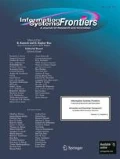Abstract
The rapid development of the social Web has resulted in diverse Web 2.0 applications for accessing various Web feeds such as Weblogs, news headlines, business products, real time information and Podcasts. Due to the masses of Web feeds available on the Internet, a major challenge is how to access them efficiently. Conventional methods of manually finding and matching keyword for Web feeds are time-consuming and inaccurate. This study addresses this issue by defining a Personalized Web Feeds Framework (PWFF) for integrating ontology technologies into Web feeds and user profiles. The proposed PWFF is used to develop an Ontology-based Personalized Web Feed Platform (OPWFP) that provides customized Web feeds for personnel needs. To demonstrate the feasibility of OPWFP, the experimental results illustrate the efficiency and effectiveness of the proposed approach.

















Similar content being viewed by others
References
Acuña, C. J., Minoli, M., et al. (2010). Integrating web portals with semantic web services: a case study. International Journal of Enterprise Information Systems, 6(1).
Armbrust, M., Fox, A., et al. (2010). A view of cloud computing. Communications of the ACM, 53(4), 50–58.
Bell, D., Cesare, S. D., et al. (2007). A framework for deriving semantic web services. Information Systems Frontiers, 9(1), 69–84.
Brewster, C., & O’Hara, K. (2007). Knowledge representation with ontologies: present challenges—Future possibilities. International Journal of Human Computer Studies, 65(7), 563–568.
Brickley, D., & Guha, R. V. (2004). RDF Vocabulary Description Language 1.0: RDF Schema. Retrieved 31 Aug. 2011, from http://www.w3.org/TR/rdf-schema.
Brickley, D., & Miller, L. (2010). FOAF Vocabulary Specification 0.98. Retrieved 30 Aug. 2011, from http://xmlns.com/foaf/spec/.
Greaves, M. (2007). Semantic Web 2.0. IEEE Intelligent Systems, 11(2), 94–96.
Guarino, N., & Welty, C. A. (2004). An overview of OntoClean. Handbook on Ontologies. S. S. a. R. Studer, Springer Verlag, pp. 151–159.
Horrocks, I., Patel-Schneider, P. F., et al. (2003). SWRL: a semantic web rule language combining OWL and RuleML. Retrieved 31 Aug. 2011, from http://www.daml.org/2003/11/swrl/.
Hsu, I.-C. (2009a). A semantic-based transcoding Mashup server for Web 2.0 sites. International Conference on Complex, Intelligent and Software Intensive Systems 2009, pp. 59–66.
Hsu, I.-C. (2009b). SXRS: an XLink-based recommender system using semantic web technologies. Expert Systems with Applications, 36(2 PART 2), 3795–3804.
Hsu, I.-C., Chi, L.-P., et al. (2009a). A platform for transcoding heterogeneous markup documents using ontology-based metadata. Journal of Network and Computer Applications, 32(3), 616–629.
Hsu, I.-C., Tzeng, Y. K., et al. (2009b). OWL-L: an OWL-based language for web resources links. Computer Standards & Interfaces, 31(4), 846–855.
Kiss, C. (2007). Composite Capability/Preference Profiles (CC/PP): structure and vocabularies 2.0. Retrieved 30 Aug. 2011, from http://www.w3.org/TR/2007/WD-CCPP-struct-vocab2-20070430/.
Kumar, S., & Mastorakis, N. E. (2010). Novel models for multi-agent negotiation based semantic web service composition. WSEAS Transactions on Computers, 9(4), 339–350.
MahmoudiNasab, H., & Sakr, S. (2009). FeedRank: a semantic-based management system of web feeds. IDEAL 2009, LNCS 5788, Springer-Verlag.
Maio, C. D., Fenza, G., et al. (2010). Ontology-based knowledge structuring: an application on RSS Feeds. HSI 2009 2010. pp. 467–473.
Matheus, C. J., Kokar, M. M., et al. (2003). Constructing RuleML-Based Domain Theories on Top of OWL Ontologies. RuleML 2003. M. Schroeder and G. Wagner. Sanibel Island, FL, USA, Springer; 2003, pp. 81–94.
McBride, B. (2002). Jena: a semantic Web toolkit. IEEE Internet Computing, 6(6), 55–59.
Murugesan, S. (2007). Understanding Web 2.0. IEEE IT Professional, 9(4), 34–41.
Nottingham, M. (2005). The atom syndication format. Retrieved 30 Aug. 2011, from http://www.atomenabled.org/developers/syndication/atom-format-spec.php.
O’Reilly, T. (2005). What Is Web 2.0. Retrieved 30 Aug. 2011, from http://www.oreillynet.com/pub/a/oreilly/tim/news/2005/09/30/what-is-web-20.html.
Samper, J. J., Castillo, P. A., et al. (2008). NectaRSS, an intelligent RSS feed reader. Journal of Network and Computer Applications, 31(4), 793–806.
Sbodio, M. L., Martin, D., et al. (2010). Discovering Semantic Web services using SPARQL and intelligent agents. Journal of Web Semantics, 8(4), 310–328.
Shadbolt, N., Berners-Lee, T., et al. (2006). The semantic web revisited. IEEE Intelligent Systems, 21(3), 96–101.
Smith, M. K., Welty, C., et al. (2004). OWL web ontology language guide. Retrieved 30 Aug. 2011, from http://www.w3.org/TR/owl-guide/.
Studer, R., Benjamins, V. R., et al. (1998). Knowledge engineering: principles and methods. Data & Knowledge Engineering, 25(1–2), 161–197.
Sun, C.-A., Rossing, R., et al. (2010a). Modeling and managing the variability of Web service-based systems. Journal of Systems and Software, 83(3), 502–516.
Sun, L., Ousmanou, K., et al. (2010b). An ontological modelling of user requirements for personalised information provision. Information Systems Frontiers, 12(3), 337–356.
Sutterer, M., Droegehorn, O., et al. (2010). UPOS: user profile ontology with situation-dependent preferences support. First International Conference on Advances in Computer-Human Interaction, 2010, 230–235.
Talantikite, H. N., Aissani, D., et al. (2009). Semantic annotations for web services discovery and composition. Computer Standards & Interfaces, 31(6), 1108–1117.
Winer, D. (2003). RSS 2.0 Specification. Retrieved 30 Aug. 2011, from http://cyber.law.harvard.edu/rss/rss.html.
Zhang, J., Akula, K., et al. (2011). A university-oriented Web 2.0 services portal. Information Systems Frontiers, 13(2), 251–264.
Author information
Authors and Affiliations
Corresponding author
Rights and permissions
About this article
Cite this article
Hsu, IC. Personalized web feeds based on ontology technologies. Inf Syst Front 15, 465–479 (2013). https://doi.org/10.1007/s10796-011-9337-6
Published:
Issue Date:
DOI: https://doi.org/10.1007/s10796-011-9337-6




